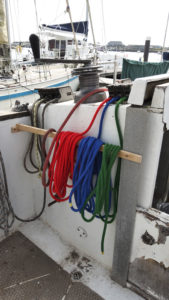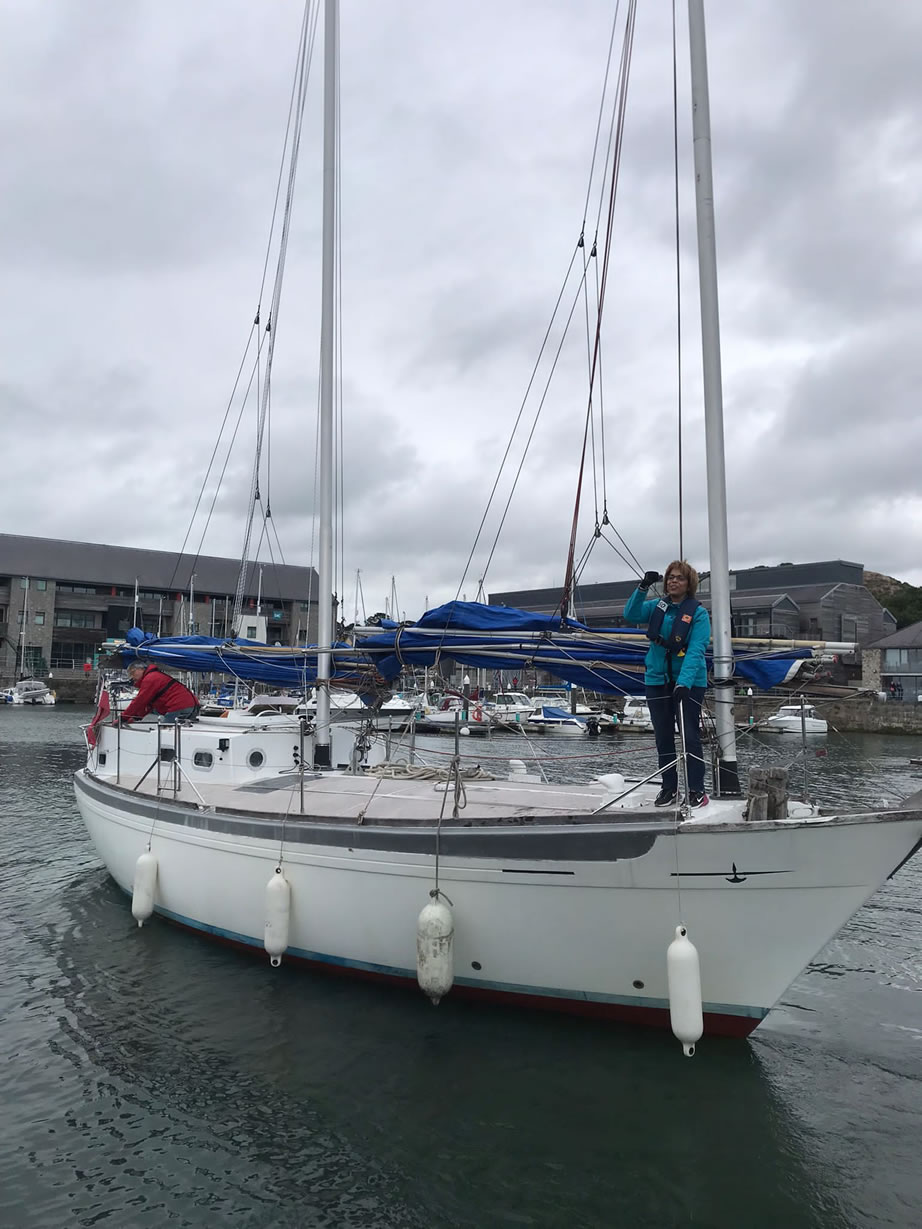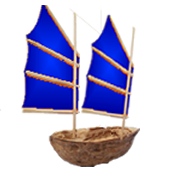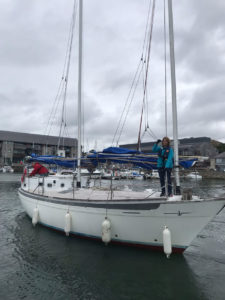From Caernarfon to Pwllheli ( First night anchorage, second grounding, moments of doubts, friendship… and subsequent decision)
Our friend John having left, Gina, who had recovered from her first difficult night crossing the Irish Sea, was now my First Officer.
Our next stop was to be Pwllheli, on the other side of the Lleyn Peninsula, some 62 miles away.
One of the first tasks was to learn how to pronounce Pwllheli. It puzzled me, but once I made abstraction of the spelling, the rest went ok.
Another preliminary task was to free ourself from the tide’s constraint. Crossing the Caernarfon bar implied leaving the marina at an inconvenient time, so we decided to cross it, then spend the night anchored in Pilots Cove, a little sheltered bay on the southern coast of Llandwyn Island. This would allow us to leave early the next morning.
Waving a last goodbye at Natalia and Marc, we left Caernarfon marina in the afternoon of August 17. It had been 6 days since our arrival.
We were in Pilots Cove one and a half hour later, and settled for our first night on anchor.
For fear of anchoring too close to the rocks, I probably dropped the hook too far from shore and the anchorage turned out to be more uncomfortable than expected. The cabin in the forepeak amplified the boat’s pitch and roll. I had nightmares of us drifting onto the rocks, woke up several times, listening to alarming sounds we weren’t used to hear. But every time I popped my head up the companion way, there were still the lighthouse and the south cardinal flashing, telling me we hadn’t moved.
It was a tiring night.
In the morning, I used for the first time our manual windlass. Pulling up forty-five meters of chain was a good morning exercise.
A little breeze was enough to have me hoist our sails. I had had enough of motoring.
We set off for Bardsey Island, which we had decided to round large rather than risking entering the Bardsay Sound, said to be difficult to cross if not at the exact right moment of tide.
Unfortunately, the visibility was poor and the sky was cloudy.
Unfortunately, the wind was dying and the swell started to rise.
Cursing, I pulled down the sails for good, 2 hours after weighing anchor.
A long motoring and unpleasant day followed. The waves were again hitting us at 90 degrees on starboard. The tiller took all my strength to keep the boat on course.
It became evident that Gina could not handle it, even for a short moment.
She was feeling bad not to be of any help. The coastline was hardly visible through the mist. The ride was uncomfortable, all but funny. There was nothing she could do but sit and endure as time was slowly passing by. Seeing her with her head in her hands against the cockpit coaming was giving me a sense of failure. I had promised nice holidays along beautiful coasts, quiet cruises under junk sails.
My mind was slowly beginning to admit that things could not go on that way.
Once heading east past Bardsey Island, we had the swell on our stern. Holding the tiller was still a full-time job. We had some dolphins speeding along our hull for a while. There was a timid sun, going down behind us.
Darkness fell as we approached Pwllheli. It started to drizzle, making visibility difficult. I tried to contact the harbour authorities, by phone and by VHF. Waiting for a response that never came, we circled outside the harbour channel, while avoiding numerous pots. In the end, we decided to enter the harbour, and improvise once we would be there.
Through the rain I aimed in the middle of the red and green lights of the channel entrance. Rounding the red buoy, the boat suddenly halted to a stop, with that characteristic rattling sound I had already heard one week before.
Again, I tried full throttle backwards, full throttle forwards, but we were grounded for good.
This came as the cherry on top of the cake. There were two more hours to go before low tide. The boat started to heel on portside. I was mad at not having had any advice from the harbour for entering the channel. I managed to have somebody from the marina on the phone, who said he couldn’t help and advised me to radio the Anglesey Coast Guards.
I felt embarrassed calling these guys for a mere grounding, but they took my call very seriously. Asking if there were any injured person on board, if we had enough water and food, how we felt if having to stay on board until next tide. They organised a life boat to come along and assess the situation, indeed it was alongside 20 minutes later with 3 persons on board.
Asked if we were OK, waded in the water under our keel to check how much we would go on heeling. Took our anchor and set it further up stream, so we would not drift when afloat. Asked if we wanted to go ashore, then insisting on us calling them back if we had any doubt.
These people are volunteers. They were extremely professional. I can’t say how much we appreciated their concern about our situation.
We decided we could outwait the tide. China Blue leaned completely, 40 degrees on her flank. Gina and I didn’t speak. Although I clearly heard her mumbling something about getting a plane back home…
Six and a half hours after running aground, China Blue was afloat again.
The Coast Guards called us on the VHF to ask if we needed more assistance.
I had another go at pulling up 45 meters of anchor chain with the manual windlass, then we motored into the harbour. It was 4 AM when we tied our lines to the first available pontoon we saw. We radioed the Coast Guards to tell them we were Ok, as they had asked us to do.
The next morning was a moment of intense doubt and thinking. We looked back on the situation since the beginning. It was decided that Gina would not continue being my First Officer. It was a common decision we took. The last thing I wanted to do was to have her disgusted of China Blue and of sailing for good. I knew she was a strong person, ready to follow me in some of my weirdest impulses, and I didn’t want to spoil that.
We agreed she would fly back home. So much for her holidays…
Then we thought of China Blue. All of my “leisure” savings had been flushed in the adventure. What more could we afford, to make her a boat we loved? We still had about 660 miles to go and nothing was supposed to get any better, regarding weather, wind and sea conditions. I would be frustrated having to motor all the way down. Was it worth it to continue?
There was a serious thought of selling China Blue, there and then.
No need to say we were both feeling very… Blue.
The power of friendship.
Marc and Natalia called us to inquire about our status. Our AIS position had somehow been frozen at Bardsey Island, according to the marinetraffic.com website. They felt our state of mind. That same evening, they drove down to Pwllheli to be with us. They were a great comfort at that moment. May them be here thanked again for having stood by us when we were a bit lost.

My new lines: Yard hauling parrel, upper battens hauling parrel, lower battens hauling parrel (note, bottom right, the companionway panel condition…)
So, things got settled. We were to remain in Pwllhelli for a while, I had to wait for the delivery of some new lines I had ordered to replace all the parrels on the sails. Gina would stay with me until she was confident the boat was ok to sail again.
I also had to find another crewmate.
Several adverts on different websites didn’t prove successful. There was a nice guy from London, ready to join me for the rest of the trip, but at the last moment he had to decline due to a potential Covid situation.
The power of friendship?
John, my first crewmate, postponed all his on-going affairs and so were his words, more or less: “I’m not going to leave you in such an awkward position”!
China Blue was to spend 12 days in Pwllheli.
Gina was gone, but with John back on board, we were bound to go on.

Because I still love this picture so much




China Blue looks great!
Well, I hope someone else willing to buy a boat will have the same opinion 🙂 !